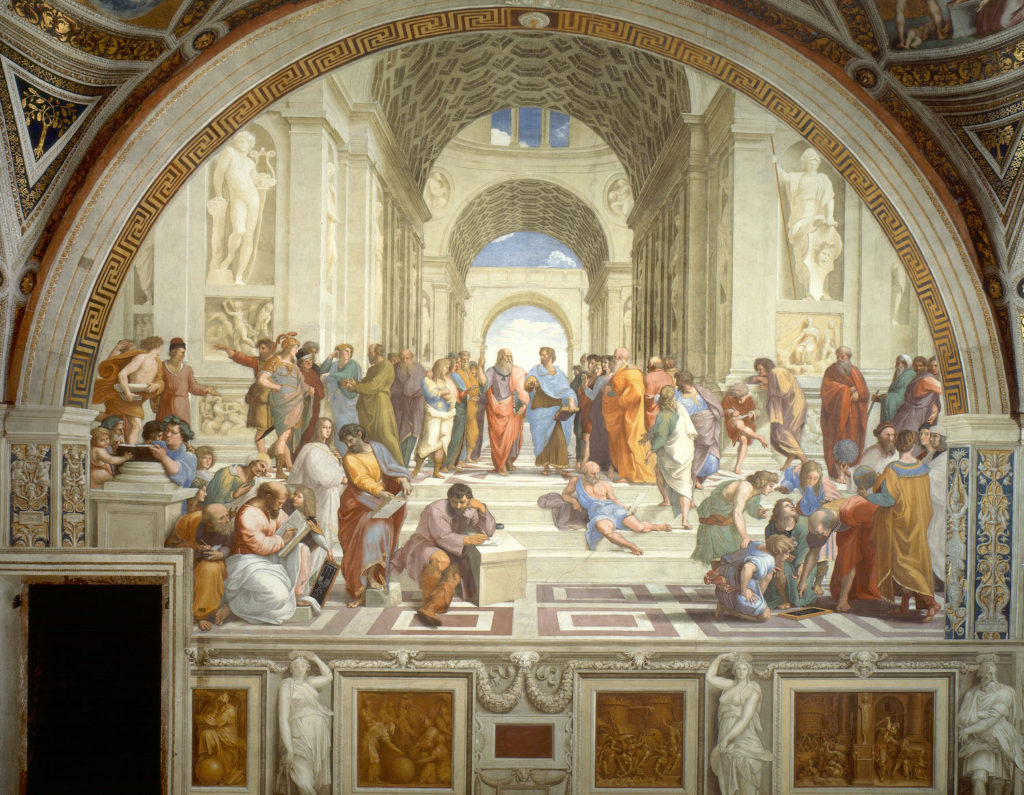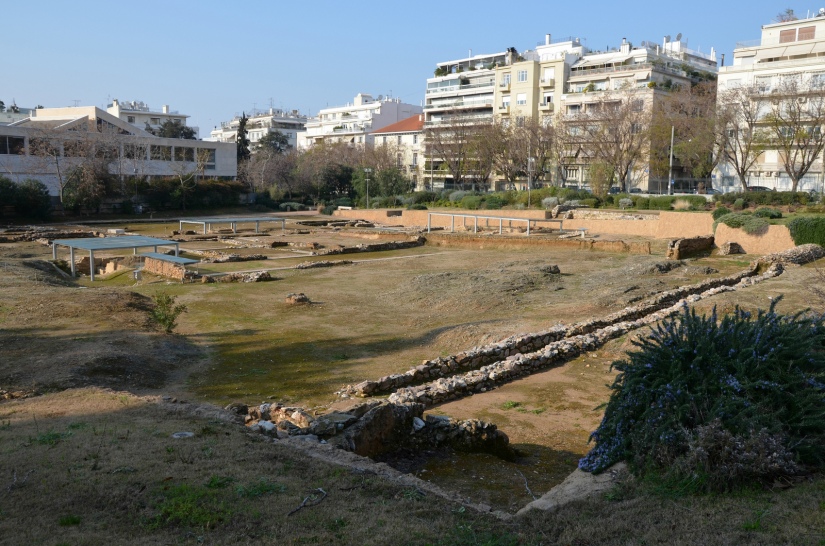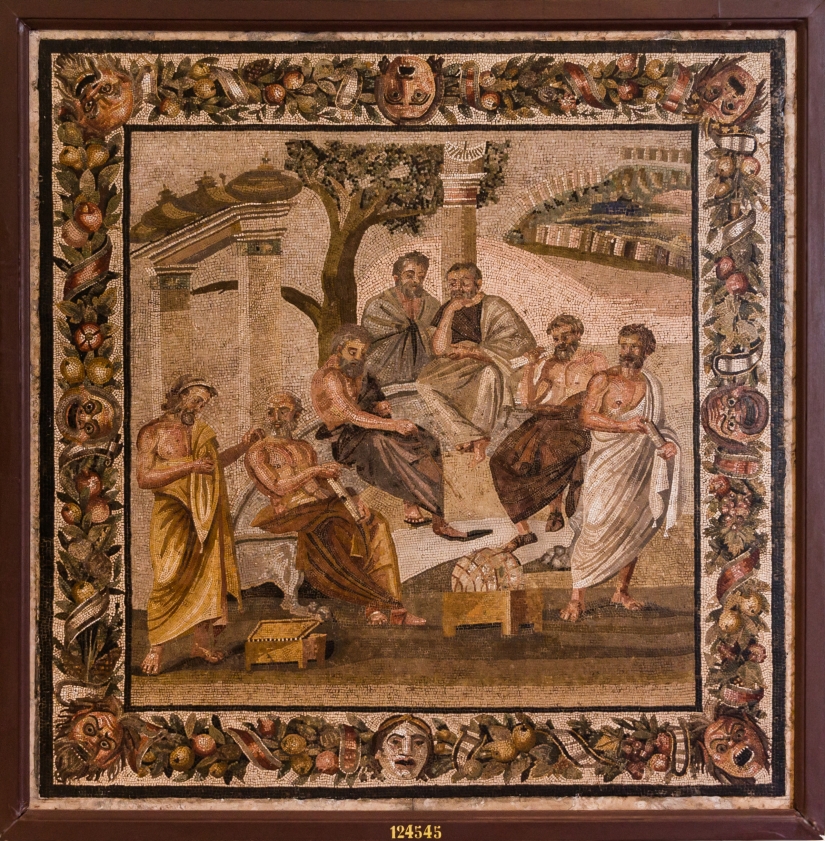But here the main skill and groundwork will be, to temper them such lectures and explanations upon every opportunity as may lead and draw them in willing obedience, inflamed with the study of learning, and the admiration of virtue; stirred up with high hopes of living to be brave men, and worthy patriots, dear to God, and famous to all ages. That they may despise and scorn all their childish, and ill-taught qualities, to delight in manly, and liberal exercises: which he who hath the art, and proper eloquence to catch them with, what with mild and effectual persuasions, and what with the intimation of some fear, if need be, but chiefly by his own example, might in a short space gain them to an incredible diligence and courage: infusing into their young breasts such an ingenuous and noble ardor, as would not fail to make many of them renowned and matchless men.
John Milton (1608-1674), “Tractate on Education”
Now we will set aside Structure and Method, and turn to Content, or curriculum. I have a lot more to say about Structure and Method, but that can wait.
What will we study, at our College? We have already decided that we will study things of a distinctly non-vocational nature; things that reflect our Values and Goals; and which are high quality materials, known as Classics or Great Books, since why would we waste our time and effort on mediocrity. We have decided that this will be an education of Breadth, not Depth, because we want to eventually have Breadth and Depth, not Depth alone (the Ignorant Specialist).
This is, basically, the Liberal Arts tradition that dates from Ancient Greece. Our school will not be so much different than Plato’s Academy, founded by Plato in 387 B.C. It was just one Special Man, and a few students. At first, it took place in an olive orchard. Plato’s student Aristotle founded the Lyceum in 334 B.C., in the same model. It lasted until 86 B.C., a period of 248 years.

Personally, I am not so much of a fan of Plato. His Republic is basically the New World Order fantasy; and has been followed as a model by the NWO crowd for centuries (it is worth reading primarily to become familiar with that blueprint). I think there is a reason that it was, somewhat pointedly in my opinion, omitted from the Harvard Classics. People in 1909 were fighting Communism then too, just as they were in the 1950s and also today. If you think about the things that were happening around that time — the introduction of the income tax, the Federal Reserve, Russia’s Communist Revolution, the Fabians, the Round Table, the League of Nations — it was indeed a desperate battle.

There is some flexibility regarding what we think is valuable enough to spend our time on. The poet John Milton, in his Of Education, recommended the mastery of seven languages including Chaldean. Ummmm, maybe not. But, it is probably a good thing that our society contain at least a few people that get an education like this, so there would be a place for Milton’s Academy too.

There are many, many, many worthwhile things that one can study, from Chinese painting during the Tang Dynasty, to marine biology, to international trade during the Renaissance, to quantum computing, to government healthcare policy. The idea of the University was to create a very large institution where a very large number of things were studied, and which supported a group of specialists who could devote themselves to these interests and also teach them to others (graduate students), rather than leaving them only in the hands of amateurs in their free time or private industry. This is not a bad idea. This is, in large part, Depth education.

But, it is not the idea of the College. The idea of the College was to reduce the field of study to just a few things that all students should study — at least, all students of a certain elevated class in society — before they went on their way to career and family; and eventually, to take leadership roles in society, in business and community, perhaps in the government itself, and certainly in their own families, where they would pass on this knowledge, values and goals to their own children for another generation. It is Breadth education. It is also elitist: to spend four years on such pursuits is certainly a luxury, and one that is appropriate only for the top 10% or so of high school graduates. Everyone else can also study these things; and did so, mostly in their free time. One reason they did so is because they were following the example of the social elite, who were able to dedicate some time to it. In actual fact, the education available in public high schools in the 1900-1910 period was better than at most colleges today.
When the University of Chicago was built in the 1890s, it represented one of the new wave of Universities in the Prussian model that was becoming popular at the time. The University of Chicago integrated the original model of undergraduate education, the College, by creating the College of the University of Chicago.
Already by the 1920s, people were complaining that the Universities that had, by then, become common were not providing the kind of education that had been previously provided by the Colleges that preceded them. These Colleges had a compact, focused, unified curriculum of Great Books; not a sprawling buffet of this-and-that where students would wander in lonely confusion. Almost from the start, and definitely by the 1920s, the Universities were already overrun by Marxists. Even in the early 1920s, at Yale, students of economics read Marx’s Capital, but did not read Adam Smith’s The Wealth of Nations. In reaction to this, we find the Great Books movement arise in the 1920s exemplified by Mortimer Adler, and in the 1930s by Robert Hutchins, president of the University of Chicago.
Part of the problem was that the common Liberal Arts curriculum of Greek and Latin, followed by major works in the original Greek and Latin, had become outdated. It was perhaps important during the Renaissance, but did not meet the needs and aspirations of the late nineteenth century. The Great Books program promoted by Adler in the 1950s was very different from what people got in the 1850s.
So, what would we have everyone (in our top 10% group) study today? This gets into the topic of Values and Goals. If we know where we want to end up, it is easier to figure out how to get there. The original purpose and Vision of America’s colleges were to create the leadership class — literally, the members of the Colonial and later State Assemblies; and the clergy, who served as the moral and spiritual leaders of the Church (in a time when everyone went to church, this meant the whole community) and also served as teachers in these Colleges and other educational institutions. They would provide the education of the “natural aristocracy” — today, these are basically upper-income families, while in the past, they would be the actual hereditary aristocracy — who could afford to pass these educational, cultural and civilizational values and knowledge on to their own children. While we can perhaps set aside direct clerical training today — though not so far aside, because we are not atheists — nevertheless the element of Moral Education should be today an important part of our Values and Goals.
Thus, the colleges were training for Statesmen, literally Members of Congress. In those days, there was a lot of overlap: children of families that could afford a Harvard education in the eighteenth century often ended up in the Statehouse. Thinking upon it today, I find that this is still a good goal: the training of a Statesman in particular contains, within in it, our broader goals and values that we would want people to have who never have any aspiration to a political role. If we think of the training and intellectual resources of our better Statesmen today — I think of people like Rand Paul, Mike Lee, Paul Ryan, and Kevin Brady — this is the kind of training that I would want to have for the general well-education citizen. Think of the greats of Statesmanship: a Lee Kuan Yew or a Francis Bacon. It is distinctly a Breadth education, although these people have their areas of specialty, Paul Ryan in economic policy and Mike Lee in Constitutional matters for example. I would say that it is NOT like: Elizabeth Warren or Andrew Yang. Warren and Yang are both highly intelligent and very capable people. But, they typify what happens when the Ignorant Specialist attempts to take on a Statesmanship role. It’s a mess.
The important direct elements of Statesmanship are: History, government and economics. These are interlocking, and form a cohesive whole. Although I am calling this Breadth, it is not just a free-for-all. We do not skip Government in favor of the Poetry of Ancient India, and we do not skip History in favor of Mechanical Engineering. We do government and history, and these other “core” subjects, and then, if we want to continue with our Breadth education, we could add Indian poetry and mechanical engineering if we want to, probably in our free time.
Also important beyond political concerns, is a general education in Western Civilization. It is, in case you haven’t noticed, our civilization. There is also Chinese civilization, Indonesian civilization, Persian civilization, Indian civilization and Egyptian civilization, which, I certainly hope, is being studied by Chinese, Persians, Indians, Indonesians and Egyptians. But, our civilization is Western Civilization, which basically means Europe and its predecessors, Rome and Greece. You can study other civilizations too, but study your own first. This is a softer series of topics, which includes: literature, philosophy (here used broadly to mean basically nonfiction literature), fine arts, performing arts, architecture and decorative arts.
Francis Bacon was Lord Chancellor (Prime Minister) under Elizabeth I, and the existence of the Virginia Colony — that is, America — is due in large part to his vision of a New Atlantis. Maybe it seems like he wouldn’t be interested poofy womanish topics like literature; as opposed to, for example, conquest and commerce. Would Francis Bacon bother to read Shakespeare, as a young man today? Some people think Francis Bacon was Shakespeare.
To this we can add a few more things. A short formal study of Logic and Reasoning, including a review of logical fallacies, can be included. You might include a foreign language; or, you might not. There are a few subjects that are worth a brief investigation, such as anthropology or environmental issues. Education itself is worth some study. A student can learn the principles that guide the design of the educational system he himself is following. That might be very Inspirational.
This list is already pretty long. I told you it would fill up quickly. There is much we have to leave out. There is not much time for dilly-dally. We will have to leave many, many interesting topics to a student’s own self-study, perhaps during the school year; perhaps during the 22 weeks of vacation during the school year; perhaps later in life.
I looked at this, and concluded that it was easiest just to adopt some materials that were carefully constructed, with great effort and expertise, to serve exactly these roles. These were the Harvard Classics, a fifty-volume review of Western Civilization compiled in 1909, and the Story of Civilization, a series by Will Durant, consisting of eleven big volumes. You can choose different materials, but it is not likely that you could do much better.
In general, the principle is to Do More. Whenever you have a list of books, there is someone who suggests a different list. In large part, this is laziness: there is a constant tendency to substitute easier, less weighty, less significant, less challenging books, under a variety of arguments. I say: do the Great Books, and if you want to, you can also read Their Eyes Were Watching God, which is laughable in comparison, but makes for an easy beach read if you feel like a little rest before starting The Brothers Karamazov. Read Thomas Aquinas, and then, if you want to, also read the Bhagavad Gita. Better yet, as an appropriate companion to Aquinas, read Paramahansa Yogananda‘s two-volume commentary on the Gita. This usually shuts people up. They were never really interested in “multiculturalism” or “diversity,” or “updating the canon to make it relevant today.” What they wanted is: to get the Carrot (the diploma) without having to read The Aeneid, or the Divine Comedy, or Leviathan, or The Spirit of the Laws, or Democracy in America, or The Prince or even the Bible. Did they instead read the Mencius or the Hagakure or the Dhammapada? Instead of studying the Great Works in their own native language, did they read any Great Works in a different language? They did not. They did not do anything at all. This is not “multiculturalism,” it is no-culturalism.
One of the reasons why we read Montaigne’s Essays (1592) is because they are relevant today. And isn’t that wonderful? We do not read the The Imitation of Christ because we want to become scholars of fifteenth-century Christian mysticism; not a very practical activity for a young person destined to work at a software company. We read it to become worthy men; and, for nearly six hundred years, people have felt this tool achieved that goal.
There is also, of course, personal preference. For whatever reason, one person really enjoys Gargantua and Pantagruel, and another person does not, but got a lot out of The Canterbury Tales. Perhaps if they read it twenty years later, when they were older and in a different frame of mind, they would have the opposite preferences. It has nothing to do with Chaucer being better than Rabelais, but with them. Virtually all men can agree on which women are among the top 10% most beautiful, but no men can agree on which is more beautiful than all the others. It is enough that our materials are among the top 10%.
Many of our eighteen-year-old students would prefer Harry Potter. But, it is not the responsibility of great authors who lived in the seventeenth century to pander to your eighteen-year-old preferences in vacuous entertainment. Think of it like doing pushups with your mind. You aren’t supposed to enjoy it. We do it because it is a proven way to get results. The goal is to attain a level of sophistication such that we can, in fact, learn to enjoy Shakespeare’s sonnets — that we can get to the point where they are actually fun and enjoyable. If you can get to that point, a lot of other things are revealed to be distastefully mediocre. It is our duty to rise to the level of the great works, not their duty to descend to ours, or be replaced by other works that do.
Unfortunately, even our Generalist Teacher of the Liberal Arts is a Specialist: he is a Specialist in General Education. Even in the days of Ancient Rome, parents complained that they would send their children off to study Philosophy, Rhetoric and Moral Education, and their children would come back with their heads full of airy-fairy notions and ill-suited to the adult world of business, hard work and adult responsibilities. It has been a problem with Liberal Arts education literally for millennia.
We have an anti-vocational bias. Our school is distinctly impractical. This is because our students will be spending the rest of their lives at practical tasks. Unfortunately, this often translates into a disdain for vocation, among Teachers. This tendency is strong among the Mortimer Adler or Allan Bloom types. This has a human element: they have a certain amount of pride, and wish for a certain amount of social standing, despite their generally low incomes. So, our school must have, integrated within it, an understanding that it is an important phase that leads thereafter to a practical adult life of hard work and vocation. One way to achieve this is to have Teachers who themselves have had a career in private industry. The training of Teachers themselves might have the opposite pattern. For these people who will make a vocation of Teaching, we might insist on a period of practical Vocation, a career in private industry, for at least four years. Teachers who have spent their entire lives within the educational system tend to make poor models, mentors and guides for Students who mostly move on to practical adult roles.
Thus, our curriculum should have within it an element that prepares students for the time of practical, vocational hard work that will follow graduation. This can be things like summer internships, and also elements of the curriculum that address business and vocation. One could be the Autobiography of Benjamin Franklin; another could be Stephen Schwartzman’s recent What It Takes. Some businessmen have written Great Books about business. One such was Virgil: his Georgics is basically a guide to running a farm. Naturally, he wrote it in Latin verse.

